‘
Vegetable dehydration is one of the oldest methods of food preservation known to man. It mostly consists of facilities engaged in artificially or naturally dehydrating fruits and vegetables. Food preservation is the main cause of dehydration by lowering both the volume and mass of the finished product. Vegetables gain value when they are dehydrated, making processing, storing, and transportation more valuable.
Due to the high quality of dehydrated meals, the value of vegetables is greater and given more priority. Additionally, there is a greater emphasis on quick and convenient cuisine. Vegetables can be dried or dehydrated using a variety of procedures. The type of drying technique used, which is based on the type of food and also the quality of the final product’s features, is the primary difference between these processes.
Visit this Page for More Information: Start a Business in Fruits and Vegetables Processing Industry
Market Size & Growth Projections (2024-2035)
Global Market Overview
The global dehydrated vegetables market has reached $88.2 billion in 2025 and is projected to grow at a CAGR of 8.1%, reaching $192.1 billion by 2035. This remarkable growth is driven by:
- 40% increase in demand for convenience foods
- Growing health consciousness among consumers
- Extended shelf life requirements in supply chain
- Rising export opportunities from developing countries
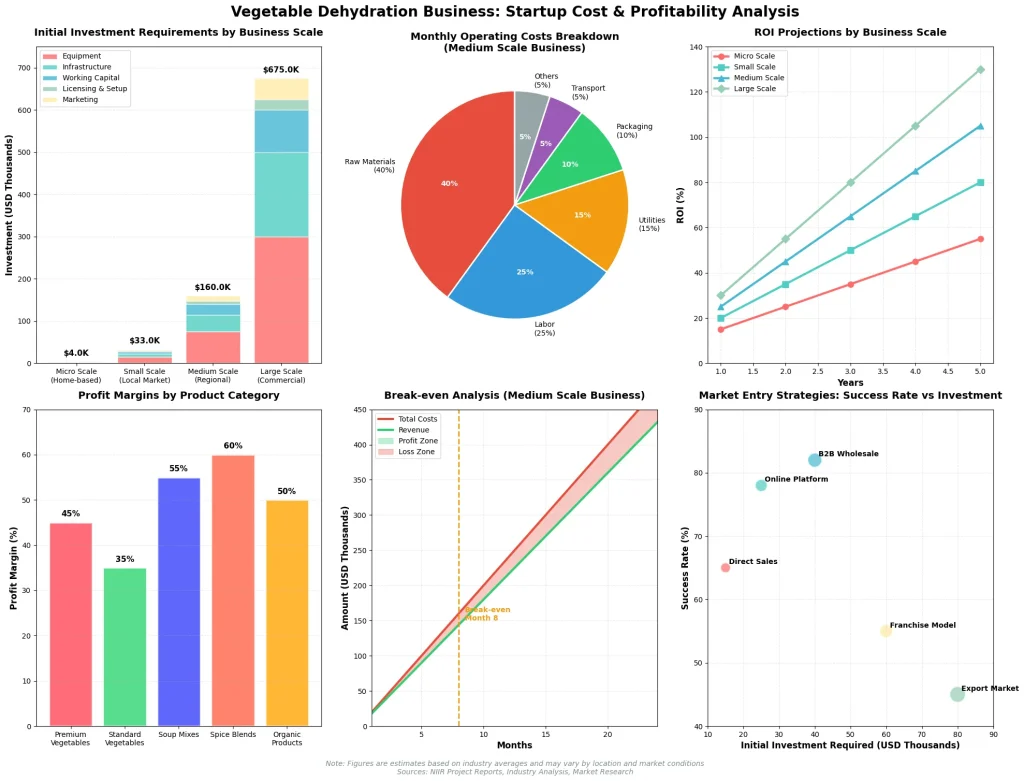
India’s Exceptional Growth Story
India represents the fastest-growing market globally with:
- Market size: $2.5 billion (2024) → $4.2 billion (2035)
- CAGR: 16.2% (double the global average)
- Export position: 2nd largest exporter with 6.04% global market share
- Production ranking: 2nd largest vegetable producer after China
Source: Straits Research, Future Market Insights, IMARC Group
How to Manufacture Vegetable Dehydration
The main step in the manufacturing of dehydrated vegetables is the elimination of water content. Businesses choose the best drying technique based on quality requirements, material properties, and economic factors.
The best thing about starting a dehydrated vegetable business is that you don’t have to work a regular schedule to run it. In addition, starting a business selling dehydrated vegetables requires a relatively small initial expenditure.
Don’t worry if you don’t know enough about dehydrated vegetables. NPCS have provided a stepwise approach that can help you learn a lot about this company venture and determine whether or not taking this step is the right one for you as an entrepreneur.
Related Business Plan: Fruits and Vegetables Value addition, Food Processing, Dehydration, Canning and Preservation, Processed Food Projects
Indian Market
Different varieties of dehydrated vegetables can be categorised in the market, including dry-out, freeze-dried, vacuum-dried, and drum-dried, etc. Overall, it is anticipated that the global market for dehydrated vegetables would grow at a CAGR of 4.8% from 2022 to 2027. India is one of the easiest regions for dehydrated food products to grow, while America is the biggest market.
There was a remarkable rise in consumer demand for non-perishable food items during the COVID-19 epidemic, particularly dried vegetable products. India continues to be one of the most significant markets for producers of dehydrated vegetables worldwide. The nation is home to the top exporters, importers, and producers of food in the world. India is expected to continue to be one of the most lucrative markets over the projected year. Next to China, India is the only country in the world that produces more veggies than any other.
India gained almost 13% of the global market in 2021.
Rising demand for dehydrated vegetables is creating major growth opportunities for producers.Let me know if you want it tailored for a specific audience (e.g., investors, startups, MSMEs).
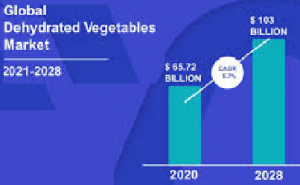
Read Similar Articles: FRUITS AND VEGETABLES
Registration and Licence Required
You need to register your dehydrated vegetable business first to operate it as a legal entity. However, you must first comprehend and set up a corporate structure before you register your company. You must establish an informed decision to have control over your taxes and legal obligations given how your dehydrated foods business was started.
You can register as a sole proprietorship, General partnership, LLC or corporation.
- GST and VAT registration
- NOC for state pollution board
- Permission for electricity and water supply
- FSSAI Registration is mandatory for any kind of food business.
Documents compulsory for FSSAI registration –
- FSSAI declaration form
- Authorized person’s address proof
- Business name and address along with proof
- Type of business details
- Passport size photo
Click here to send your queries/Contact Us
Documents Required for FSSAI Licence –
- FSSAI declaration form
- ID Proof of the Business Owner (Aadhaar Card / Passport / Driving License / Voter ID)
- Rental Agreement of business land.
- Government Registration Certificates (Firm Registration / Pan card / Partnership Deed / Company Incorporation Certificate / GST Registration Number / Trade License / Shop and Establishment Registration)
- For applying for State License any One of the certificates is mandatory (Shop and Establishment Registration, Trade license, Panchayath License, Municipality License, Corporation License)
- Copy of the Partnership Deed or MOA & AOA.
Investment
Your dehydrated vegetable business will fail even if you sell some of the best-dehydrated food products on the market because you lack the necessary funding. “To start your dehydration business, you will need both initial and operating capital. For example, you’ll be covering high rent, promoting your products, and hiring employees with competitive salaries and benefits.
Fortunately, one of the biggest advantages of starting a dehydrated vegetable business is that it can often be launched on a small scale. Small firms, such as those producing food, will profit from a variety of incentives, subsidies, loans, and equity investments.
Related Feasibility Study Reports: Dehydration And Canning Of Fruits And Vegetables -manufacturing Plant, Detailed Project Report, Profile, Business Plan, Industry Trends, Market Research, Survey, Manufacturing Process, Machinery, Raw Materials, Feasibility Study, Investment Opportunities
To get funding sources you should also prepare certain documents –
- Dehydrated Food Business Plan.
- A detailed document on how the funds will be used.
- Description of products offered by your dehydrated vegetable business.
- Projected Financial Statements.
- Tax returns of the business owner and business.
Land Acquisition
If you’re starting a dehydrated vegetable business on a small scale, then it is best to start by taking land on lease. As you gradually expand and start earning profits, you can eventually look for a larger plot of land. Regardless of your business size, however, you will need a facility that includes a processing hall, fumigation room, warehouse, storage area, generator room, staff offices, and restrooms for employees.
Success Stories & Profitability Analysis
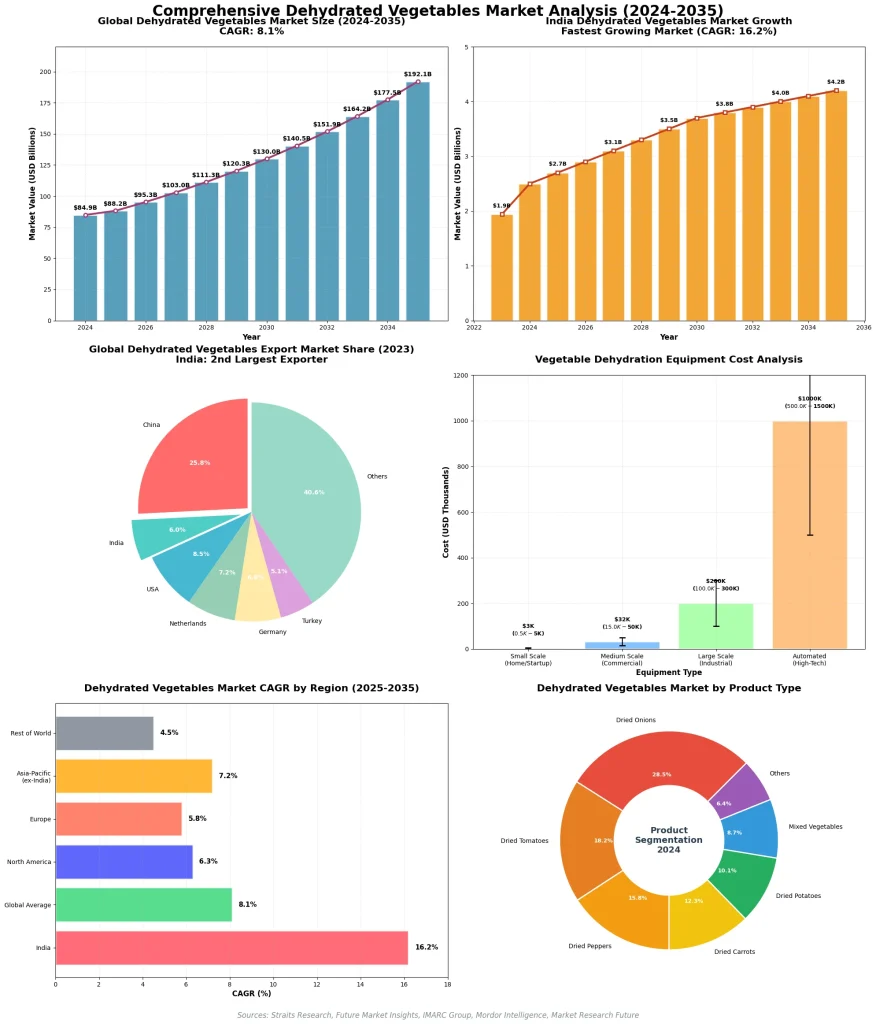
Real Success Cases from India
Case Study 1: Nurture Fields (Telangana)
- Founded: 2022 by Keerthi Priya and Odapalli Vijaya Laxmi
- Achievement: 2,000+ orders, 1,600+ customers, pan-India delivery
- Impact: Farmers earning ₹10,000-15,000 monthly (vs. ₹3,000-5,000 earlier)
- Key Success Factors: Direct farmer partnerships, demand-based cultivation
Case Study 2: Zilli’s (Hyderabad)
- Founded: 2018 by Anubhav Bhatnagar
- Growth: 20 units (Month 1) → 1,500 units (Month 6)
- Revenue Split: 70% e-commerce, 25% exports, 5% B2B
- Key Products: Zero-preservative vegetable powders
Profit Margins by Product Category
- Premium Organic Vegetables: 45-50%
- Standard Dehydrated Vegetables: 35-40%
- Soup Mixes & Blends: 55-60%
- Spice Blends: 60-65%
- Export Quality Products: 40-55%
Break-Even Analysis
- Micro Scale: 6-8 months
- Small Scale: 8-12 months
- Medium Scale: 12-18 months
- Large Scale: 18-24 months
- Energy Efficiency: 50% more efficient than conventional methods
- Cost Savings: 30-40% reduction in operating costs
- Quality: Better color and nutrient retention
- Speed: 60% faster than traditional methods
- Quality: Minimal nutrient loss
- Application: Best for leafy vegetables and herbs
- Penetration: Deep heat penetration for uniform drying
- Retention: Better flavor and aroma preservation
- Energy: 20-30% energy savings
- Monitoring: Real-time temperature and humidity control
- Quality: Consistent product quality
- Efficiency: 25% improvement in production efficiency
- Organic Segment: Growing at 12% CAGR
- Freeze-Dried Products: Premium segment with 15% market share
- Ready-to-Cook Mixes: 20% annual growth
- Export Demand: 8% increase in international orders
Emerging Dehydration Technologies
1. Heat Pump Dehydration
2. Microwave-Assisted Drying
3. Infrared Drying Technology
4. Smart Automation & IoT
Market Trends 2024-2025
Conclusion
To run a successful dehydrated vegetable business, you must first gain in-depth knowledge of the industry. Not only will this make starting your venture easier but it will also significantly support future scaling.
Frequently Asked Questions:
- What Equipment Do I Need to Start a Vegetable Dehydration Business?
- Answer: To start a vegetable dehydration business, you’ll need equipment such as a food dehydrator, cutting and slicing tools, packaging materials, and storage facilities. The specific equipment required may vary depending on the scale of your operation.
- How Do I Choose the Right Vegetables for Dehydration?
- Answer: When planning your dehydration business, selecting the right vegetables is crucial for success. Ideally, choose vegetables with high water content, strong flavor, and consistent market demand. For example, common options include tomatoes, bell peppers, onions, and carrots. Additionally, conduct market research to identify the most popular and profitable choices in your target region.
- What are the Necessary Food Safety and Quality Regulations for Vegetable Dehydration Businesses?
- Answer: Compliance with food safety regulations is vital. Ensure your business adheres to local, state, and federal food safety standards, including proper sanitation, labeling, and packaging requirements. Consider seeking guidance from your local health department or a food safety consultant.
- How Can I Market my Dehydrated Vegetable Products Effectively?
- Answer: Effective marketing is essential to grow your vegetable dehydration business. Consider creating a strong online presence through a website and social media platforms. You can also explore partnerships with local grocery stores, farmers’ markets, and restaurants. Highlight the nutritional benefits and convenience of your dehydrated vegetables in your marketing efforts.
- What are the Key Challenges in the Vegetable Dehydration Industry, and How Can I overcome them?
- Answer: Common challenges in this industry include fluctuating raw material costs, competition, and maintaining product quality. To overcome these challenges, establish reliable supply chains for your raw materials, differentiate your products through quality and packaging, and continuously innovate to stay ahead of the competition.
These frequently asked questions should provide you with a solid starting point for your vegetable dehydration business venture.
Select and Choose the Right Business Startup for You
An excellent report on the dehydrated vegetable industry is produced by Niir Project Consultancy Services (NPCS). You will learn about frozen veggies, their market strategies, and business goals in this research.
The sector for dehydrated vegetables is expanding because of consumer demand and preference for packaged foods. We tried to cover all the pertinent dehydrated vegetable facts. Please get in touch with us via our official NPCS website if you have any questions or concerns about this project.
Vegetable Dehydration Manufacturing Industry is one of the project report by Niir Project Consultancy Services (NPCS). The project report covers all the aspects of business, from analyzing the market, confirming availability of various necessities such as plant & machinery, raw materials to forecasting the financial requirements.
The project report by NPCS has benefited engineers, project consultants & industrial consultancy firms not only in India but worldwide. With the project reports on various business plans, NPCS also publishes technology, technical, reference, self-employment and startup books, directory, business and industry database, and a lot more which you can check on the official website.
Reasons for Buying NIIR Report:
- Our research report helps you get a detailed picture of the industry by providing an overview of the industry along with the market structure and classification.
- Our report provides market analysis covering major growth driving factors for the industry, the latest market trends and the regulatory framework of the industry.
- Our Report provides an analysis and in-depth financial comparison of major Players / Competitors.
- Our Report provides indispensable buyers; data with their company financials as well as the contact details, which can be an important tool in identifying the target customers.
- Our report provides forecasts of key parameters which help to anticipate the industry performance.
- We use reliable sources of information and databases. And information from such sources is processed by us and included in the report.

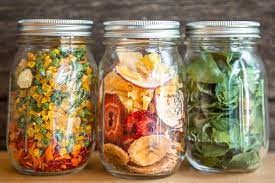

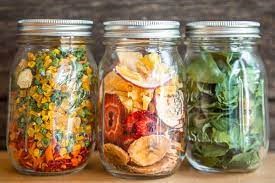





Dehydrating vegetables is a time-tested method of preservation, adding value by reducing weight and extending shelf life. With low startup costs and high demand for non-perishable foods, especially in markets like India, this business offers a promising opportunity. Entrepreneurs can capitalize on growing consumer interest in convenience foods and the global trend toward sustainable food production. Proper licensing and knowledge of various dehydration methods are key to success in this expanding industry.
What is the cost of your project report in dehydration business